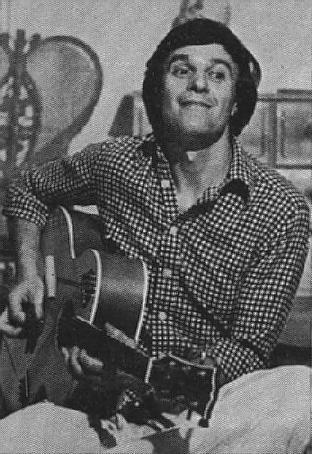|
A
fleet of clouds sails clear of the midday sun, and a klieg from heaven
gleams through the skylight of a Manhattan loft and onto John McLaughlin,
sitting cross-legged on his kitchen counter. Though he emerged last winter
from an eight-year discipleship to the guru Sri Chinmoy, John still
meditates daily and wears the Indian dhoti. At 34, McLaughlin is the Jerry
Brown of music, except that these days he can't get elected - at least on
the pop charts.
To most critics and cognoscenti, though, the British-born McLaughlin is
the most accomplished of all jazz-rock guitarists and an influence
sometimes compared to Coltrane. In performance, with his new group on
campuses and in small clubs, musician friends like Carlos Santana have been
stunned by McLaughlin's dizzying speed and clarity, and his brilliant
fusion of fluttering sitar-like inflections with intricate jazz
improvisation.
He made his name (and up to $20,000 a night) in the early 70s as
Mahavishnu, with a searing, fearsomely loud, electric group called the
Mahavishnu Orchestra and such informative albums as The Inner Mounting
Flame. But McLaughlin has now forsaken all that to gather up three superb
Indian musicians on violin, hand drums and ghatam, and gone into acoustic,
raga-type compositions. Shakti, which translates "creative intelligence
and power" in Sanskrit, is the title of this new group as well as of its
first LP.
A sumptuously spiritual and refined man, McLaughlin shrugs: "Whether
people accept this music or not, I don't give a damn. I know how good - and
how right - this group is. We all sell out to a point. And don't get me
wrong, I like living comfortably and having a nice car. But if money
determines your art, then what's the point?" McLaughlin rents on the
shabby Lower West Side and drives an Audi. He is now just an opening (if
not show-stealing) act for groups like Weather Report, for which his
germinal success with electric jazz-rock helped cut a commercial clearing.
Though he also trailblazed for such major followers as Chick Corea and
former Mahavishnu drummer Billy Cobham, McLaughlin found the genre
ultimately limiting. "You can scream and wail with electric music," he
says. "It has a physical intensity acoustic music lacks, but subtlety goes
right out the door. The more noble sentiments, strength, courage,
tenderness, pathos, joy, tragedy - these are stifled. Shakti is the proper
form for their expression."
McLaughlin, since leaving Chinmoy's Centre, has voyaged through India and
returned more secular. His hair is its longest in eight years. He now
indulges in an occasional cigarette or taste of wine or beer. And, after
his second marriage split up last fall (that wife was also in the ashram
and helped him run a restaurant in Queens), he finds, "I like to have
pretty woman around me - who doesn't?"
John hasn't completely severed with Chinmoy, but is no longer a disciple.
"I love him very much, but I must assume responsibility for my own
actions. When my sweet wife walked out on me, that catalyzed everything,"
he explains. (His first marriage produced a son, Julian, now 11, living in
England, whom "I don't see as much as I'd love to. We are pals, sort of at
the 'hanging out' stage.")
McLaughlin's loft reflects the serenely uncomplicated daily life that
provides easy access to higher states. Coffe table books tend to be erudite
tomes on Eastern mysticism. There is a meditation area with a bronze of
Buddha's wife nestled among a half-dozen trees, and McLaughlin takes a
simple delight in watering the plants. He relishes cooking Indian or
Italian, and dries his wash on a line near his Ping-Pong table. His more
violent pastimes include scuba-diving and sking.
The youngest of five children, John was born in Yorkshire, England, but
moved at age 7, with his mother, to a tiny seacoast village just south of
Scotland when his parents split. His father, a turbo-engineer, wanted John
to follow him, but recalls McLaughlin, "I got almost everything from my
mother, a violinist - and my brothers. They were Ph.D.s, intellectuals,
great debaters. I remember very little about my father."
McLaughlin's first guitar at 11 was a hand-me-down. Three years of
classical piano study helped him "cop everybody's licks off records -
Leadbelly, Coltrane, Krupa, Miles Davis, Oscar Peterson, Tal Farlow, Muddy
Waters." By 16, he'd quit school and gone to work in a guitar repair shop,
until a friend coaxed him to gig on the road that led to London.
McLaughlin's heaviest dues there were in recording and TV sessions, where
he played "plug-in, you-name-it, chinky, toppy, computerized guitar" for
Humperdinck, Bacharach, Anka, Nero and Warwicke. In 1970 his growing rep
led him to join Miles Davis on his famous Bitches Brew LP. By then
McLaughlin, already an occult probing the eastern religions, yoga,
psychedelic drugs and astral projections, had met Chinmoy and "begun the
awesome task of searching for self-awareness."
"The artist, mad fool that he is," says McLaughlin, "is intuitively
aware that what is inside him is real - The Truth. I believe one can know
the unknowable, but only in perfect silence. We realize the utter futility
of trying to speak the unspeakable," he says. "But there is a delightful
pointlessness and mystery about it that makes life so beautiful."
|

